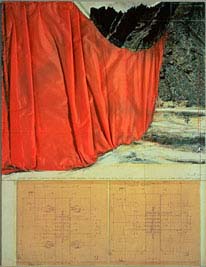Christo and Jeanne-Claude
dal 3/2/2002 al 23/6/2002
Segnalato da
3/2/2002
Christo and Jeanne-Claude
National Gallery of Art, Washington
In the Vogel Collection presents 61 works, including preparatory drawings, collages, scale models, and photographs of the artists' large-scale projects, as well as several of Christo's early packages and wrapped objects.

The first survey mounted in
the United States
encompassing four decades
of work by Christo and
Jeanne-Claude will be on
view at the National Gallery
of Art, East Building, 4
February through 23 June
2002. Christo and
Jeanne-Claude in the Vogel
Collection presents 61
works, including preparatory
drawings, collages, scale
models, and photographs of
the artists' large-scale
projects, as well as several
of Christo's early packages
and wrapped objects. The show draws its contents from
the collection of Dorothy and Herbert Vogel at the National
Gallery of Art, an important collection of contemporary art
acquired in 1991. The show also includes works given and
promised to the nation in honor of Dorothy and Herbert
Vogel.
The Christos have created some of the most visually
breathtaking works of the 20th century using fabric in,
over, through, and around natural and constructed forms,
said Earl A. Powell, director, National Gallery of Art. The
Gallery is grateful to Dorothy and Herbert Vogel, Christo and
Jeanne-Claude, and a private collector for generously
pledging these inspiring works to the nation.
The Exhibition
The variety of media and the breadth of the work offer a
unique overview of Christo and Jeanne-Claude's career,
tracing the development from the contained forms toward
the freer, more open structures that approach tensile
architecture. As the Christos have created an individual
expression using fabric, their art has transcended the
traditional boundaries of painting, drawing, sculpture, and
architecture.
The exhibition opens with several of Christo's earliest
packages and wrapped objects, including Package 1961, a
wrapped and intricately bound mass of objects, and
Package 1974, made for the Vogels, whom Christo and
Jeanne-Claude met in 1971. The installation continues with
drawings and collages for most of the artists' monumental
projects and includes large-scale photographs of the
completed works.
The first of the artists' temporary projects in a rural
setting, Wrapped Coast, One Million Square Feet, Little Bay,
Sydney, Australia, 1968-69 entailed wrapping a portion of
the Australian coastline with one million square feet of
erosion control synthetic mesh fabric the color of straw and
35 miles of rope.
Valley Curtain, Grand Hogback, Rifle, Colorado, 1970-72
marked a significant development in the artists' oeuvre,
signaling the first time they used fabric in an open,
noncontaining manner. Valley Curtain was also the first
work by the artists situated in the American landscape. For
the installation, a bright orange curtain of nylon was
suspended in a V-shaped valley between two mountains
and set against the blue Colorado sky. The vertical veil
format of Valley Curtain evolved in a logical, though
ambitious, progression into a white, ribbon-like structure
(24 miles long and 18 feet high) in Running Fence, Sonoma
and Marin Counties, California, 1972-76.
In Wrapped Walk Ways, Loose Park, Kansas City, Missouri,
1977-78, Christo and Jeanne-Claude covered 2.7 miles of
walkways and jogging paths with 135,000 square feet of
saffron-colored nylon fabric. This work provided a more
intimate experience, for visitors to the park actually walked
on the fabric.
Considered for its planarity as their most painterly project,
Surrounded Islands, Biscayne Bay, Greater Miami, Florida,
1980-83 involved floating 6.5 million square feet of bright
pink woven polypropylene fabric on the water around 11
islands in Miami's Biscayne Bay. The last project the
Christos conceived that involved wrapping a pre-existing
structure was The Pont Neuf Wrapped, Paris, 1975-85. For
this work, the artists covered the 16th-century
Pont-Neuf--the oldest bridge in Paris--with 440,000 square
feet of golden sandstone polyamide fabric and eight miles of
rope.
The only project to introduce more than one color into the
landscape was The Umbrellas Japan--U.S.A., 1984-91. It
was simultaneously installed in two locations on opposite
sides of the Pacific Ocean, with 1,340 blue umbrellas in the
Ibaraki Prefecture of Japan and 1,760 yellow umbrellas in
Los Angeles and Kern Counties, California. These colors
represented the respectively wet and dry environments in
which they were installed.
Wrapped Reichstag, Berlin, 1971-95, the most ambitious of
the artists' wrapped buildings, represents perhaps the
greatest challenge and achievement in the career of Christo
and Jeanne-Claude. Wrapped Trees, Fondation Beyeler and
Berower Park, Riehen, Switzerland, 1997-98, an idea Christo
and Jeanne-Claude had tried to realize since 1966, was
their last completed project.
Three projects are in varying states of progress: The
Mastaba of Abu Dhabi, Project for the United Arab Emirates,
begun in 1977; The Gates, Project for Central Park, New
York City, begun in 1979; and Over the River, Project for
the Arkansas River, Colorado, begun in 1992. The Gates
emphasizes the footpaths in a park setting and underscores
the organic design of Frederick Law Olmsted's plan for
Central Park. In this project, translucent saffron-colored
fabric will be suspended from 15-foot steel gates along the
pathways to form a 26-mile golden passage.
With Over the River, Project for the Arkansas River,
Colorado, seven miles of fabric panels will be suspended
horizontally above the Arkansas River over a 40-mile
stretch (with interruptions) from Salida to Cañon City. The
project may be seen from above (by motorists on the road
that runs along the river and by hikers on the footpaths
leading to the water) and from below (by rafters and
kayakers on the river).
Image:
Christo Valley Curtain, Project for Colorado, Grand Hogback, collage 1971
The National Gallery of Art and its Sculpture Garden, located on the National Mall
between Third and Ninth Streets at Constitution Avenue, NW, are open Monday
through Saturday from 10 a.m. to 5.p.m. and Sunday from 11 a.m. to 6 p.m. The
Gallery is closed on 25 December and 1 January



